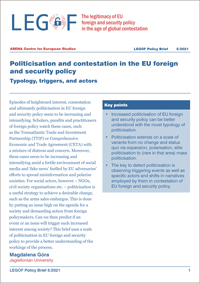 Episodes of heightened interest, contestation and ultimately politicisation in EU foreign and security policy seem to be increasing and intensifying. Scholars, pundits and practitioners of foreign policy watch these cases, such as the Transatlantic Trade and Investment Partnership (TTIP) or Comprehensive Economic and Trade Agreement (CETA) with a mixture of distress and concern. Moreover, these cases seem to be increasing and intensifying amid a fertile environment of social media and ‘fake news’ fuelled by EU adversaries’ efforts to spread misinformation and polarise societies. For social actors, however – NGOs, civil society organisations etc. – politicisation is a useful strategy to achieve a desirable change, such as the arms sales embargos. This is done by putting an issue high on the agenda for a society and demanding action from foreign policymakers. Can we then predict if an event or an issue will trigger such increased interest among society? This brief uses a scale of politicisation in EU foreign and security policy to provide a better understanding of the workings of the process.
Episodes of heightened interest, contestation and ultimately politicisation in EU foreign and security policy seem to be increasing and intensifying. Scholars, pundits and practitioners of foreign policy watch these cases, such as the Transatlantic Trade and Investment Partnership (TTIP) or Comprehensive Economic and Trade Agreement (CETA) with a mixture of distress and concern. Moreover, these cases seem to be increasing and intensifying amid a fertile environment of social media and ‘fake news’ fuelled by EU adversaries’ efforts to spread misinformation and polarise societies. For social actors, however – NGOs, civil society organisations etc. – politicisation is a useful strategy to achieve a desirable change, such as the arms sales embargos. This is done by putting an issue high on the agenda for a society and demanding action from foreign policymakers. Can we then predict if an event or an issue will trigger such increased interest among society? This brief uses a scale of politicisation in EU foreign and security policy to provide a better understanding of the workings of the process.
Politicisation and contestation in the EU foreign and security policy: Typology, triggers, and actors
Magdalena Góra
Published Oct. 11, 2021 8:54 PM
- Last modified Oct. 11, 2021 8:55 PM